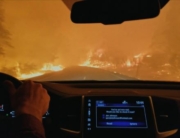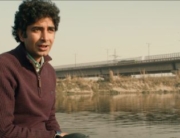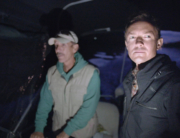In 2010, famed novelist and occasional essayist Jonathan Franzen published a long piece in The New Yorker titled “Emptying the Skies,” about the illegal trapping of migratory songbirds, like warblers, wrens, and sparrows, in the Mediterranean region. Franzen’s 11,000 word cri de coeur has been condensed into an alternatingly serene and ghastly 77-minute documentary. Consisting mainly of on-the-ground footage from the filmmakers embedded with antitrapping activists, with stingily apportioned snippets from Franzen, leading ornithologists, and environmental scientists, the film mostly succeeds in reminding viewers how much lonelier the world would be without our constant winged companions.
Songbirds are perching birds, so-called for the arrangement of their feet enabling skillful, expert perching during their astoundingly long journeys. (These tiny, palm-sized birds routinely travel 5,000 miles from South Africa to Europe.) Perching birds comprise nearly half of all bird species, and songbirds comprise by far the most abundant lineage of this species. They have complex, delicate vocal organs, enabling some of the most melodious, inspiring sounds found anywhere in nature.
Unfortunately, their incredibly long migratory patterns force them to gorge, making them essentially tiny flying balls of fat, and so are considered a delicacy throughout Europe, especially in Cyprus. The island, a vital stopping point during their migratory journeys, has possibly the densest songbird traffic in the world.
Cyprus is where the bulk of the on-the-ground filming takes place, following the beyond dedicated members of the Committee Against Bird Slaughter (CABS) as they do whatever they can to strike blows against poachers. It’s actually the law of the European Union to protect migratory songbirds from poaching, as they are legally considered part of the shared heritage of all Europeans. The CABS activists trespass on the private property of gun-wielding, hot-headed Cypriots, and they have the scars and welts to prove it.
The bulk of the film follows the CABS troops throughout their anti-poaching endeavors as well as their personal lives. We gain a vivid sense of how central advocacy is to them, how truly tortured they are by the thought of songbirds being trapped and eaten, and it’s easy to admire them, though probably hard, for most, to imagine taking up with them.
Among the most shocking parts are seeing the various cruel methods poachers have for ensnaring their prey. The traps have names such as limestick, bow trap, and, worst of all, the stone crush trap. Limesticks are branches, ideal for perching, coated in sticky glue. Bow traps are spring-loaded contraptions that shatter a bird’s tiny legs to pieces, and stone crush traps are exactly what they sound like. A large part of the work of CABS is finding these traps and dismantling them, or freeing birds hopelessly stuck on limesticks. Birds found in bow traps or stone crush tools are, sadly, beyond all help.
At times it feels like Emptying the Skies is more of a chronicle of the lives of CABS members than it is an examination of the issues and policies surrounding songbird poaching. Experts touch on many threatening factors—like environmental degradation—making the poaching of millions of them an insult to injury. Fuller development of these topics might have enriched the film at the expense of yet another scene centering on the zeal of the CABS troops. Franzen doesn’t appear much, but he’s typically eloquent and insightful about the larger importance of being kind to songbirds.
While there is plenty of unprecedented footage of the birds being freed from dastardly traps, the film struggles to do much more than preach to those already in the choir of animal welfare activism. There isn’t quite enough substantive information about the surrounding political and environmental matters, or quite enough passion to stir true outrage, to win over many converts.







Leave A Comment